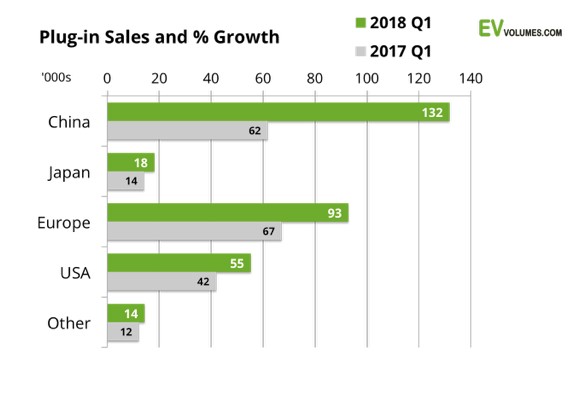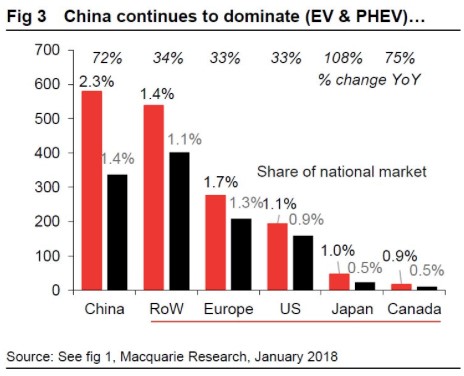Supported by a hard push by the Chinese government to drive up electric car sales, annual EV sales are on track to hit a one-million-unit milestone this year, as demand continues to rise significantly.
Chinese EV sales doubled in April, with the government-backed China Association of Automobile Manufacturers showing 81,904 sold that month, or an 11.5-percent increase compared with the same period last year. In total, that means China sold 1.9 million vehicles.
China sold 225,310 EVs in the first four months of this year, for a whopping 149-percent increase over the same period in 2017.
Overall, Chinese sales over the period totaled 9.5 million vehicles (electric and traditional), up roughly 5 percent.
In terms of EVs, China’s sales accounted for nearly 50 percent of all EV sales in the first quarter of 2018 worldwide.

(Click to enlarge)
Beijing aims to sell 2 million EVs in 2020 through aggressive promotion of EVs with subsidies and restrictions on the registration of conventional vehicles, making it the definitive dominating force in this segment:

(Click to enlarge)
While China ramps up EV sales, the Trump administration is seeking to roll back fuel efficiency standards in the U.S., which is likely to further boost Beijing’s dominance.
On Friday, Trump met with auto industry executives at the White House, where he instructed the administration to explore avenues of negotiation with California on a single fuel economy standards.
Ford and GM find themselves torn on the issue, trying to balance public support for better fuel efficiency and strong consumer demand for lower-mileage trucks and SUVs that would benefit from less strict fuel standards. Related: HSBC Hits Milestone With Its First Blockchain Trade
Overall, the auto industry would like to see fuel efficiency standards eased, but not significantly enough that it would lead to a legal battle with California and result is two different standards, which would get messy—and expensive--for carmakers.
At the end of the day, fuel efficiency standards might be better for the balance sheet.
"Companies are always going to push for what's best for their bottom line, and at this point, a compromise with California to maintain a single standard makes the best business sense," Investors.com quoted Jeremy Acevedo, manager of industry analysis at Edmunds, as saying.
In the meantime, Tesla has moved to significantly boost its position in China while at the same time avoiding high import tariffs.
According to the National Enterprise Credit Information Publicity System, Tesla has registered a new electric car firm in Shanghai with focus on EVs, spare parts and batteries. The move comes as China gets ready to scrap rules on capping foreign ownership of NEV ventures this year and on all automotive ventures by 2022.
Tesla currently imports all the cars it sells in China from the United States and has other wholly-owned firms registered in China focused on sales and research and development. The new rules will allow Tesla to maintain control of its own plant and protect its technology.
Earlier this month, Tesla said it planned to announce a Chinese location for a new battery Gigafactory by the third quarter of 2018.
By David Craggen for Safehaven.com
More Top Reads From Safehaven.com:
















